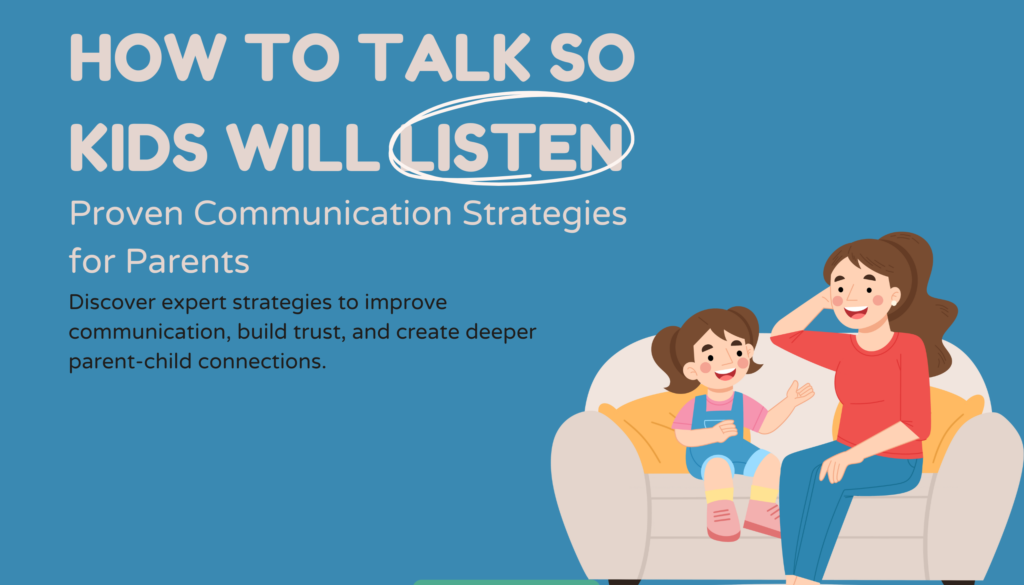How to Talk So Kids Will Listen: Proven Communication Strategies for Parents
✨ Introduction: Why Kids Don’t Listen (And What You Can Do About It)
If you’ve ever asked your child to do something—only to be ignored or met with a dramatic “No!”—you’re not alone. Many parents struggle with getting kids to listen without yelling, bribing, or losing their cool.
But what if I told you that the key to cooperation isn’t control—it’s connection?
In this guide, we’ll explore proven parenting communication tips that actually work. You’ll learn how to talk so your child will listen, build trust, and create a home where everyone feels heard—including you.
🧠 Understand Why Your Child Isn’t Listening
Before we dive into strategies, it helps to understand why children tune out. Here are a few common reasons:
-
They feel unheard or disrespected
-
Instructions are too long or unclear
-
They’re overwhelmed, tired, or distracted
-
They’ve learned that “listening” isn’t expected until you raise your voice
📌 Pro Tip: Kids don’t ignore us on purpose. They’re developing brains trying to manage a world full of stimulation. The better we understand this, the more effective (and calm) our communication becomes.
💬1. Use Short, Clear, and Respectful Language
Kids respond best to language that is:
-
Simple: Use short sentences
-
Direct: Be clear about what you expect
-
Kind: Speak with warmth and respect
✅ Instead of saying:
“How many times do I have to tell you to clean up this mess before dinner?”
Try this:
“Please clean up the toys before dinner.”
👉 This shifts the focus from frustration to clear direction, which is easier for a child to follow.
🧍♀️ 2. Get on Their Level—Literally and Emotionally
Eye contact and gentle touch go a long way.
How to do it:
-
Squat or sit so you’re at eye level
-
Use their name softly
-
Connect with a warm tone before making a request
💡 Example: “Sami, I see you’re really into your game. I need your help setting the table in 5 minutes, okay?”
This builds connection before correction.
🧘 3. Listen First, Then Speak
If we want kids to listen to us, we must model active listening.
How:
-
Pause what you’re doing
-
Look at your child
-
Reflect their feelings: “You’re upset that playtime ended, huh?”
When kids feel heard, they’re more likely to cooperate.
🎯 4. Offer Choices (Within Limits)
Giving kids a sense of control makes them less likely to resist.
Try:
-
“Do you want to wear the red or blue pajamas?”
-
“Should we clean up before or after snack?”
🎉 Bonus: Choices foster decision-making skills and confidence.
🧩 5. Set Clear Expectations (and Follow Through)
Children thrive with predictability and consistency.
Be clear about:
-
What behavior is expected
-
What the consequence will be
-
That you’ll follow through kindly and firmly
🔑 This builds trust in your word and teaches accountability.
📖 Real-Life Example: From Frustration to Connection
Let’s say you ask your 6-year-old to put their shoes on, and they ignore you.
Instead of yelling, you pause. You kneel down, make eye contact, and say:
“I know you’re having fun building. It’s time to go to school. Do you want to put your shoes on by yourself or should I help?”
Suddenly, you’re not a drill sergeant. You’re a partner.
📊 Communication That Builds Lifelong Bonds (Not Just Obedience)
Good communication with kids is about more than just getting them to “do what you say.”
It teaches:
-
Empathy
-
Boundaries
-
Problem-solving
-
Emotional intelligence
You’re not just raising a well-behaved child. You’re raising a resilient adult.
🔁 Internal Links:
🌐 External Links:

Have you tried any of these strategies with your kids?
💬 Share your experience in the comments below—your story could help another parent!
📩 Or subscribe to our newsletter for more peaceful parenting tips straight to your inbox.




Building Strong Relationships with Your Teenager kid.
April 9, 2025 @ 2:32 pm
[…] How to Talk So Kids Will Listen […]